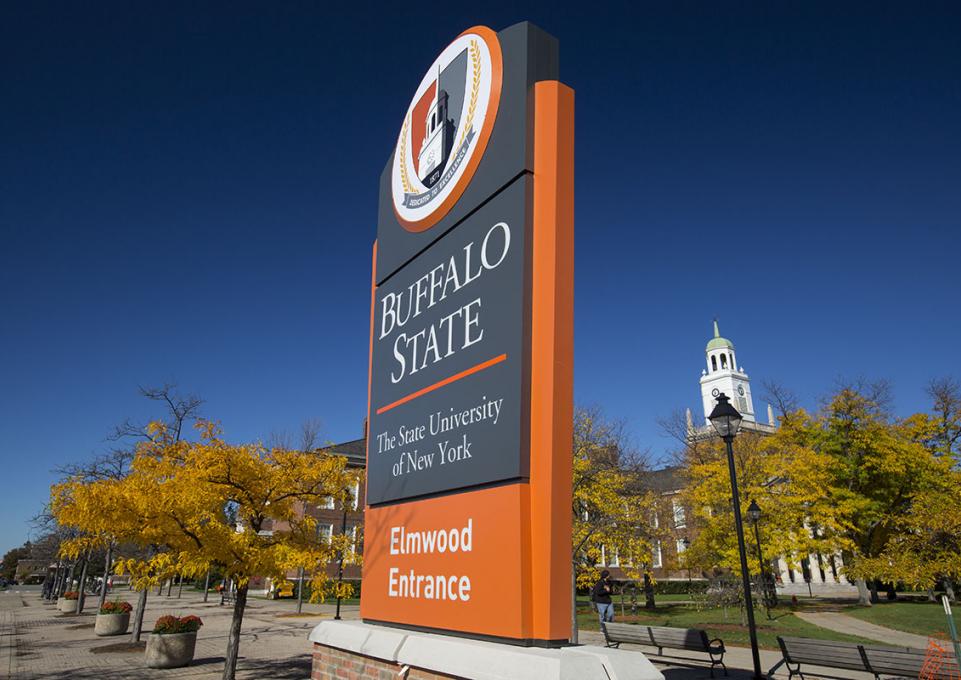
Buffalo State has been selected as an inaugural member of the Higher Education Anchor Mission Initiative. It joins 30 other U.S. college and universities for inclusion in the national collaboration designed to develop and share new strategies for deploying higher education’s intellectual and place-based resources to enhance the economic and social well-being of the communities they serve.
Higher education institutions like Buffalo State are anchor institutions: local economic engines and mission-driven organizations inextricably linked to the long-term well-being of their local communities. They’re uniquely positioned to play an active role in supporting the local economy. By intentionally implementing an anchor framework, Buffalo State will enhance its service to its public mission. The Higher Education Anchor Mission Initiative will provide a national platform to accelerate this important work.
The initiative is a joint project of the Coalition of Urban and Metropolitan Universities (CUMU), a national organization dedicated to connecting urban universities and their partners, and The Democracy Collaborative (TDC), a national research institute developing strategies for a more democratic economy. It is supported by the Annie E. Casey Foundation.
The initiative builds upon the work completed for TDC's “Anchor Dashboard Learning Cohort,” of which Buffalo State was a member. Beginning in 2013, six urban schools—Buffalo State, Cleveland State University, Drexel University, Rutgers University-Newark, University of Missouri-St. Louis, and Virginia Commonwealth University—collaborated in a multi-year process to pilot effective metrics for tracking anchor mission impact. The initiative will be informed by the best practices identified by this cohort, whose six members will become members of the initiative.
“From our Community Academic Center, where we offer citizenship and language classes, to ongoing collaborations with the Buffalo Public Schools, to our significant contributions to the local economy, Buffalo State has a firm commitment to making our community a better place to live, learn, and prosper,” said Buffalo State President Katherine Conway-Turner. “Being an urban-engaged campus is the centerpiece of our strategic plan, and we are thrilled to be included within the Anchor Mission Initiative.”
The 31 participating member institutions are Augsburg University, California State University Los Angeles, Cleveland State University, College of Staten Island, Drexel University, Florida Atlantic University, Georgetown University, Indiana University Northwest, Indiana University-Purdue University Indianapolis, Johns Hopkins University, Marquette University, Metropolitan State University, Metropolitan State University of Denver, Portland State University, Purdue University Northwest, Rutgers University-Camden, Rutgers University-Newark, SUNY Buffalo State, Towson University, University of Arkansas at Little Rock, The University of Chicago, University of Denver, University of Louisville, University of Michigan-Dearborn, University of Missouri-St. Louis, University of Pittsburgh, University of San Diego, Virginia Commonwealth University, Wagner College, Weber State University, and York University.
According to TDC President Ted Howard, “Colleges and universities in the U.S. collectively employ over 4 million people, spend over $43 billion each year, and hold over a half-trillion dollars in their endowments, which means their potential impact as community wealth-building anchor institutions is enormous.”
Recognizing this potential, CUMU has worked with TDC to select leading higher education institutions from its membership to join the initiative as inaugural members.
“The initiative is invaluable to CUMU members,” said CUMU Executive Director Bobbie Laur. “Whether public or private, CUMU member institutions are anchored by place and recognize an obligation to their communities to address challenges and work with partners to find creative, equitable solutions. This initiative will guide universities across the country to expand current collaborative work and to form more strategic partnerships that benefit the economic and social well-being of their communities.”
